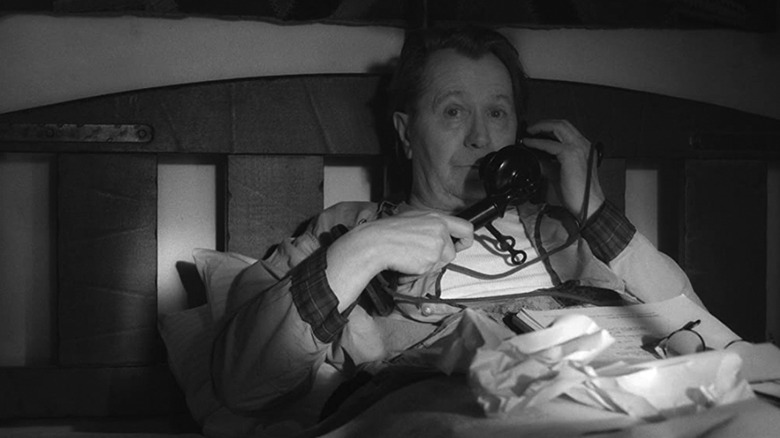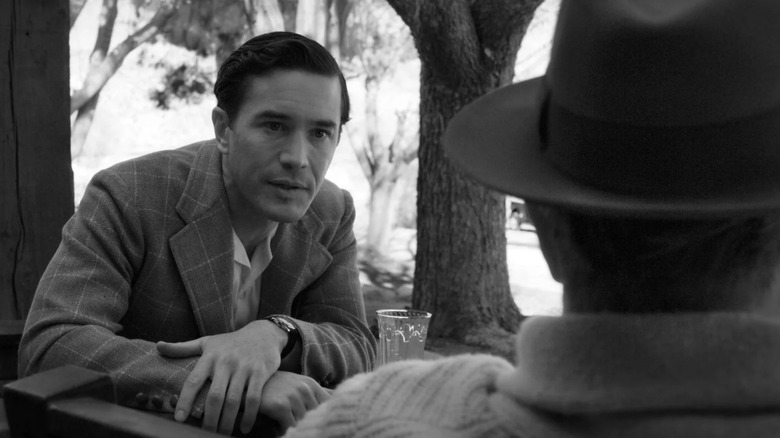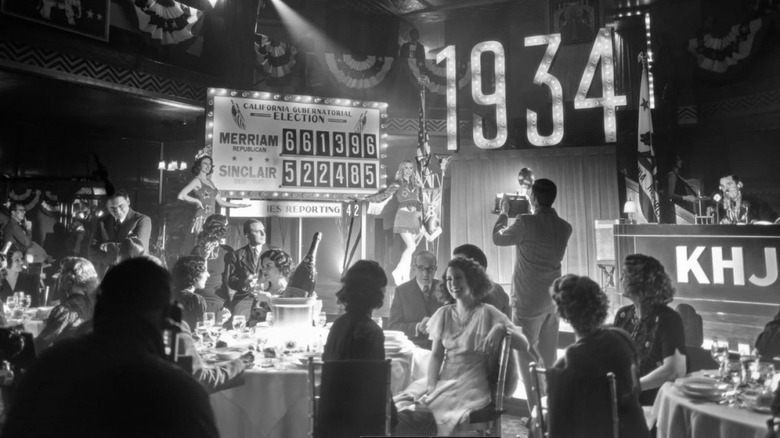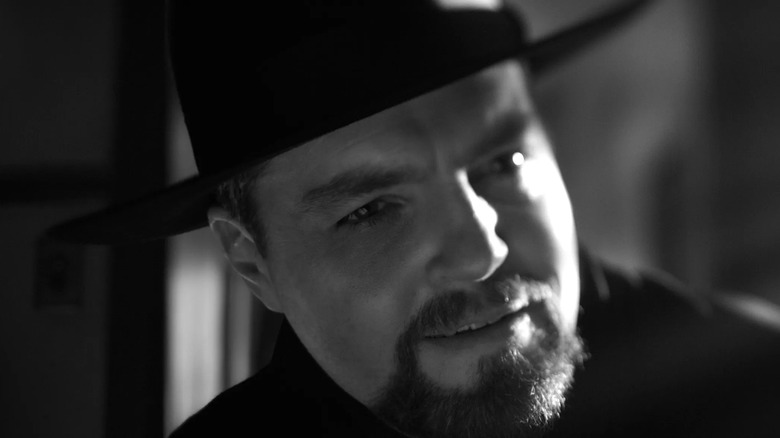David Fincher Didn't Hold Back On His Father's First Draft Of Mank
At a glance, "Mank" might seem like an odd film for David Fincher to make. The director broke his streak of lurid crime thrillers for a biopic about the co-writer of "Citizen Kane" — and not even Orson Welles, but Herman J. Mankiewicz (Gary Oldman). Fincher's reason for making the movie was personal: His late father, Jack, wrote the screenplay and wanted his son to direct the movie.
Jack Fincher was a journalist by trade; the peak of his career was serving as San Francisco Bureau Chief at Life Magazine. When he retired in the early 1990s, he decided to follow his son into the movie business as a screenwriter. David Fincher has a well-deserved reputation as a cynic and a perfectionist, and as he tells it, even his own father wasn't spared from these sides of his personality.
Fincher on Fincher
For Variety, Fincher spoke with Ben Affleck, the star of his last film before "Mank," and the two discussed how the film came to be. According to Fincher, his father had great respect for the screenplay as an art form, unlike the gun-for-hire Mankiewicz. Jack Fincher felt the barebones terseness of a screenplay (i.e. no-to-little internal dialogue, a 90-120 page upper limit, etc.) meant writing one was a genuine challenge — one he was eager to undertake.
In the Fincher household, father and son shared reverence for "Citizen Kane," Jack having introduced it to David early in his son's life. As David Fincher recounts, he was 12 or 13 when he discovered "Raising Kane," Pauline Kael's infamous (and inaccurate) 1971 essay arguing Mankiewicz was the true writer of the film, not Welles. Wrong as they were, Kael's words clearly left an impression on the Finchers. Years later, when Jack asked his son what to write about, David suggested, "What about Herman Mankiewicz? I've always thought he was a funny dude. He's an odd sort of character to follow through a film."
Jack Fincher took his son's advice, but when David read the finished draft, he wasn't terribly impressed. And he didn't sugarcoat his feelings to his father, either. As Fincher recalls, "He gave me this thing. I read it. And I said, 'You know, I don't think he got it.'"
According to Fincher, his father was understanding since Jack Fincher was much the same way himself.
"To be perfectly honest, I didn't get this [ability to be blunt and straightforward] out of nowhere, I got it from him. He was almost always the guy who was, gonna tell you ... No matter how painful. I always immediately run through and I go, 'Well does he need? He needs to hear this.' And then I just launched."
How the script changed
So, what was it about Jack Fincher's first "Mank" draft that David disliked? For one, the tone. Fincher called his father's draft a "pollyanna" and compared its depiction of Hollywood to "Singin' In The Rain." The final film's view of the movie business is much closer to David Fincher's usual cynicism, as evidenced by the scene in which MGM studio boss Louis B. Mayer (Arliss Howard) suckers his employees into accepting a pay cut with crocodile tears.
David Fincher also states he, as a director, wasn't interested in the idea of who deserved "credit" between Welles and Mankiewicz: "Credit wasn't the reason to make the movie." Luckily, Jack Fincher happened on a new core for the film when he saw a documentary about how Mayer and media baron William Randolph Hearst influenced the 1934 California gubernatorial election with movie reels made at MGM. This helped swing the election Republican Frank Merriam over Democrat Upton Sinclair (eventually played in "Mank" by Bill Nye the Science Guy). Fincher recalled his father pitching him:
"Here's a guy who more than 30% of his output as a screenwriter, he happily gave up any kind of credit on. He's an adult, he signed a contract with the Mercury Theatre, he knew what he was doing. And for one brief, shining moment, he really wanted to revise that. What if there was something else that he had tossed off in the same kind of glib way that came back to haunt him? So that we could dramatize the thing that he desperately wanted on its headstone, and the thing that he would love to never be known for."
Mank and Kane
By shifting focus like this, the script and the eventual film created an odd situation. "Mank" purports to be about the writer of "Citizen Kane," since that's the marketable logline. Yet, much of the film ostensibly doesn't have all that much to do with "Citizen Kane." The few scenes with Orson Welles (Tom Burke) are some of the weakest, particularly the last one where he throws a tantrum over Mank demanding a co-writing credit (the influence of "Raising Kane" rearing its head).
"Kane" and "Mank" share some political messaging, mostly about the dangers of letting the wealthy control the media. In "Kane," the title character declares that readers of his newspapers will think "what I tell them to think." Hearst's sway over politics proved that someone of comparable power to Kane could back up this declaration (and, of course, Kane was famously inspired by the real-life Hearst). The framing device of Mankiewicz dictating the screenplay that becomes "Kane" to Rita Alexander (Lily Collins) brings the character's guilty conscience full circle. As he's believed to have done in real life, Mank is channeling his disillusionment with Hearst into the screenplay.
However, these links are more spiritual than anything. The end result is a film about the co-writer of "Citizen Kane" but isn't actually about the writing of "Citizen Kane." One of the best things "Mank" has going for it is that, flawed as it is, it's still a labor of love from a son for his father.



